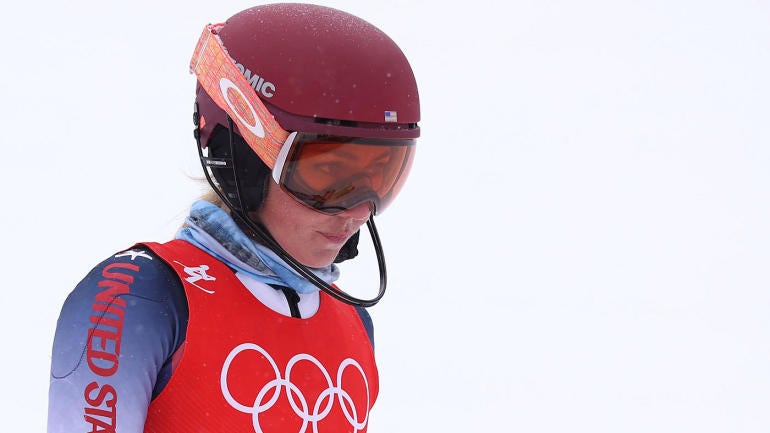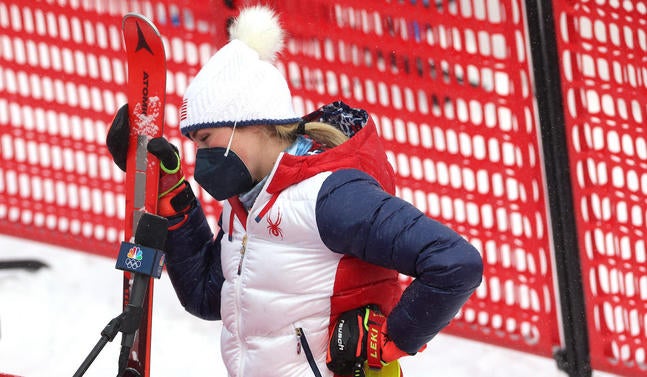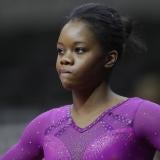
Rarely in sports have we seen someone so great -- in the peak of their prime -- fail so obviously yet so inexplicably. It happened again on Thursday to the greatest U.S. Alpine skier in history, 26-year-old Mikaela Shiffrin. She was to be one of the stars, if not the American star of the 2022 Winter Olympics, but instead has become a mysterious case study in the yips.
Only "the yips" isn't really a thing in skiing. You usually either ski successfully or you fall. There is barely any time for second-guessing.
Instincts, razor-sharpe technique and muscle memory built up over thousands and thousands of runs are necessary components of not just competing in alpine skiing events -- they're critical to preventing serious injury. In skiing, you don't think. You just do.
After falling in shocking fashion in the giant slalom and slalom -- two events Shiffrin was expected to medal in, if not take the gold -- earlier at these Olympics, Shiffrin again lost her edge near the 11th gate of the slalom portion of Thursday's Alpine combined event. Another fall, another DNF.
Another WTF.
"I don't know what I'm supposed to fix, that's the frustrating thing," Shiffrin said on the NBC broadcast. "I don't think there's something to fix. It just went really, really wrong, because I didn't feel like I was supposed to win today, I didn't feel pressure."
This is not how we're used to seeing Olympians. More often than not, the world's greatest athletes produce winning races, routines and performances on this type of stage. The Olympics sells stories and often delivers the goods. If a gold medal, or any medal, falls short of that for the best of the best, it's usually narrowly short. Failure at this level on this stage from such a fantastic athlete -- its rarity is only surpassed by its shock factor. Because skiing is different from the sports most everyday Americans love, it's hard to think of an analog to other figures that would compare to Shiffrin's plight. It might be like Patrick Mahomes suddenly being unable to complete a throw beyond five yards, or Dustin Johnson mysteriously losing his ability to hit a straight golf shot. You can't compute such a scenario.
Until these Olympics, the same applied to Shiffrin, who has long been the Mahomes of her sport. That's how gracefully natural skiing has been for Shiffrin, who holds 73 World Cup championships and has been a pro since she was 15. She won her first World Cup at 16, her first Olympic gold at 18 and in the past decade has unequivocally established herself as the greatest slalom skier in history.
In Beijing, none of that has mattered.
Shiffrin fell three times in five individual events, previously skiing out in the giant slalom and slalom. The other two -- downhill and Super G -- ended with her crossing the finish line but well out of contention for a medal (though she wasn't expected to win in either of those events).
It started well for Shiffrin in the combined on Thursday. It was her best chance to medal. NBC commentator Dan Hicks said "we expect Mikaela Shiffrin to take over the lead, big-time" a moment before she pushed out for the slalom portion of the combined, as if the alternative wasn't on the table.
But it was.
Shiffrin took fifth in the downhill portion of the event hours earlier. Riding on Italian silver medalist Sofia Goggia's skis, Shiffrin made a couple of minor mistakes but otherwise cruised. At No. 5 after downhill competition, Shiffrin was ahead of all her true competitors in the forthcoming slalom.
With this as backdrop, Shiffrin was poised to put her disasters from earlier in the Games behind her and become the most decorated U.S. Olympic Alpine skier in history. Shiffrin owns two golds. No one from the United States has ever won three individual ones in Alpine skiing. It was almost a foregone conclusion for some that Shiffrin would become the first by the end of these 2022 Games.
For her slalom run, she was smooth out of the gate -- until she wasn't. Less than 13 seconds in, Shiffrin was on her butt. This scene. Again. A DNF from the world's greatest. Stunning, even as coda. Even more so when considering that Shiffrin's training runs were unspoiled. She had the top training run in the combined. Again she'd enter as the favorite. Why shouldn't she? Elite skiers do not forget how to ski. They know the mountain. They lean into the curves, embrace the slope and make friends with ever-present danger as gravity snatches them and says, "Let's go."
But the mountain won again.
Amid her mystifying miscues, Shiffrin has been beyond admirable. She wears it all, and I found myself in awe of her willingness to talk through her debacles. She's the biggest name in skiing and she doesn't hide behind anything. She is not too big nor proud for an interview. (It must be noted she's doing this while grieving, at least partly through a public lens, over the past two years following the unexpected death of her beloved father.)
"I've never had the experience where actually good skiing had this kind of mistakes," she said on NBC. "It wasn't actually even a mistake. And I was smarter on this first pitch -- first four turns -- but I wasn't even holding back. I was trying to give my feet a little bit of space, find my rhythm. I got my rhythm, I accelerated off the pitch. Everything there was just exactly in line with what I wanted to feel, what my best slalom can produce, and I don't know if it was some combination of driver error, maybe a small little track and the snow, and maybe you can't see it and I didn't react quick enough or whatever it it was.
"I don't know. I wasn't going to try to get to the finish today and, like, slide my way down to the finish. I wanted to ski a good run of of slalom. I don't know. I feel like a joke."
Shiffrin is no joke. Anything but. She is the ultimate competitor. She never balked at competing in any event, even though it would have been understandable and largely embraced if she decided not to compete after her bomb-outs last week. She doesn't need a single win in China to validate her brilliant career.

Three times at these Olympics she has failed to get to the bottom of the mountain successfully. Three times she has gone on television, and then into the press pool, and held herself accountable, made no excuses, shrugged off no interviews. She exposes her psyche in the immediacy of defeat with more self-deprecation and raw emotion than most athletes I can remember.
It's not just refreshing, it's astonishing in this era when so few athletes will offer true, long-winded transparency about their athletic performance, particularly when those performances don't end the way they -- and we, the audience -- want them to. A lot of people could learn a lot from her composure in the face of such public failure.
"You know the saying: doing the same thing over and over and expecting different results is insanity?" Shiffrin said on NBC. "Well, I was doing something different. I was shaking out my shoulders, smiling a bit. I had quite a lot of fun today. Even skiing the slalom, even the first six turns, I was like, 'Oh gosh, this is the feeling I want to have. Thank goodness.' And just pushing, just feeling the good feeling.
"I just wanted to have it a little bit longer. Unfortunately, there's the side of it is medals, oh man, I don't know if anybody's failed that hard with so many opportunities -- maybe in the history of the Olympics. But I will take it. I mean, it is a joke. It's just, that's fine, I just really selfishly wanted to have a good run of slalom down this hill and I'll be left wanting there."
Some woman. Some competitor. Perhaps this is all therapeutic. Whatever the reason, Shiffrin is an inspiration. Yes, this is sports. It's competitive, grueling, cutthroat, rewarding. It's all of that and more. Alpine skiing is as dangerous as about any sport. But there are bigger things to life that plunging yourself down a mountain in order to achieve validation, and on some level Shiffrin seems to be acknowledging that as she speaks through her defeats.
Get a load of this perspective:
"I think there is a lot of positive," Shiffrin said of failing to cross the finish line in her three best events. "Some of the best skiing I've ever done here, in Beijing, in the training, in the downhill over the last week, in my slalom even today. And in the race, in the moment when it counts, then I didn't make it to the finish and that's never happened in my entire career.
"So I don't understand it, but there was so much positive that's happened in the last couple of weeks despite how much it really stinks, and I don't know, sometimes you have to take it. I don't know."
Last week, her previous ski-outs led Shiffrin to admit: "This makes me second guess, like, the last 15 years, everything I thought I knew about my own skiing ... and my own racing mentality."
She also admitted she couldn't shake visions of her failure to clear the fifth gate in the giant slalom. Ironically, it's been her inability to win a medal -- or finish races -- that have made Shiffrin the most compelling American athlete at these Winter Games.
Her Olympics still aren't done. Shiffrin will go one last time in the team event, which will air Friday night in the United States. A last push for the podium. A medal would be incredible, but it's not going to make or break these Olympics for her. Shiffrin is sending a bigger message -- even if unintentionally -- about the values of humility, accountability, and why bad outcomes don't have do define who you are as an athlete, or even as a person, especially when those outcomes happen in the most shocking of ways.





















